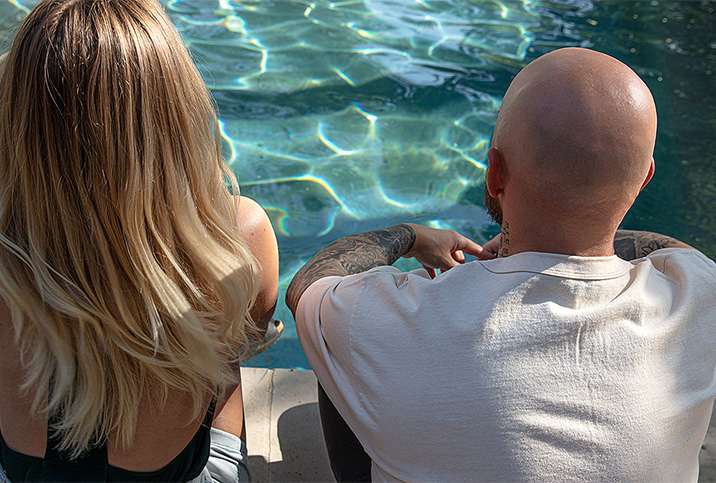Dating After the Loss of Your Spouse

On his first date with another woman after losing his wife to suicide, Abel Keogh was overcome with guilt and betrayal.
"I felt like I was cheating on my late wife," he wrote on his website.
It took about five dates for Keogh, an author and a relationship coach in Utah, to shake the guilt and enjoy another woman's company. Within a few months, he met his now-wife, Juliana.
Although every widow or widower's journey is unique, Keogh's experience isn't altogether unusual. Dating is often a whirlwind for everyone, but it's distinctly complex for surviving spouses.
Marti Stany, L.C.S.W., B.C.D., a certified Erotic Blueprint coach based in Texas, acknowledged the death of a spouse or long-term partner is one of the most challenging experiences a person can endure. During the grieving process, it can be overwhelming to contemplate dating and sex with another person, and it's absolutely normal to miss sex and intimacy with a dying or recently deceased partner, she said.
"Reclaiming a vibrant sex life and building a romantic relationship with someone else after the death of your spouse is an extremely personal journey, and it will take some time to figure out what feels right," Stany wrote in an email interview.
5 dating tips for widows and widowers
At some point, most people feel ready to find love again. Here are some words of advice from relationship experts:
Take your time
After a while, you may feel pressure from friends, family or society to begin dating again when they feel you should be over your loss. Although this typically comes from a good place—your loved ones' collective desire for your happiness—the decision of when to date is ultimately yours.
"There isn't a timeline for when the desire for closeness and intimacy will arise," Stany said. "You are the only person who can decide when you're ready to date again and experience physical intimacy."
Keogh and Emily Simonian, M.A., L.M.F.T., head of clinical learning for Thriveworks Counseling in Washington, D.C., agreed, noting that many widows and widowers are ready within months, while others take years. Some may choose to never date again.
According to Simonian, one indicator that you're ready to date again is that you have the emotional capacity to honor your deceased spouse's memory while simultaneously caring for other people.
"In the grief process, it's common to become emotionally overwhelmed to the point that you're not able to give as much emotional energy as you typically would to others," Simonian explained. "This can be any relationship in your life, not necessarily romantic relationships. Trying to date will be easier when you're in a place where grief isn't overpowering other facets of your life."
Even if you think you're ready, experts advise to remember grief isn't linear and it's OK to take a step back if needed.
"Expect ups and downs," Stany said. "Grief and dating can be emotional roller coasters, and life can feel out of control. Take these experiences one day at a time and don't plan too far into the future. With such a significant loss, searching for stability and security in new relationships can be tempting. This is an opportunity to find that stability and security within yourself, and with family and close friends."
Reconnect with your sexuality
Sex with a new partner can be thrilling, petrifying or both, particularly if it's been a while. After a loss, these emotions can be prominent and intermingled with others, such as guilt and sadness.
Changes to physical appearance and functionality can further complicate matters, especially if you and your spouse were together for many years. To reestablish a healthy sex life, Stany advised reconnecting with yourself before involving others.
"Your sexuality is part of you, even after this incredible loss," Stany said. "Before jumping into bed with a new partner, get acquainted with your sexual self. This is an essential first step since many people don't engage in self-pleasure in long-term sexual relationships. Taking the time to explore pleasure in your body can create a strong sense of sexual autonomy before embarking on a new sexual journey. Discover what your sexual needs are now."
If you're experiencing physical difficulties, including age-related challenges such as vaginal dryness or erectile dysfunction (ED), consider talking with a doctor to explore options. A sex and intimacy coach can also help overcome physical and psychological hurdles.
"This type of coach is skilled at helping you learn more about yourself and what you truly want," she continued. "They can be an excellent resource to help you reclaim or claim your sexuality and desires throughout this significant life transition."
When you're ready to have sex with another person, Stany recommended communicating your needs and desires openly.
"Over the long term, honest communication about sex after a loss can bring relief to those who are grieving and those who are comforting them," Stany added. "Openly and respectfully expressing emotional and physical needs with a new partner creates a foundation of compassion and trust for this new sexual exploration."
Set boundaries and chart a new path
According to Keogh, fully opening your heart to new love is a challenging, multifaceted process. Along with inner work and intimate communication, forging a new relationship may require significant changes.
"There's a price to pay when it comes to starting a new relationship, and many widows and widowers aren't willing to pay it," he said. "The new love isn't going to plop down and take the place of the late spouse. You need to create a new life with them. A successful, long-term relationship may require redefining relationships with family and friends, taking down photos of the late spouse, selling or redecorating your home, and doing other things that show your new love that they are number one."
A new partner must respect that your late spouse will always have a place in your heart, Keogh continued. For most surviving spouses, honoring their deceased partner's memory becomes a part of life. According to Brianna Campbell, L.M.F.T., L.P.C., clinical manager at Two Chairs, a mental healthcare practice in Oakland, California, this circumstance shouldn't threaten the new partner's feelings of security, but it's important to discuss feelings and boundaries to find an appropriate way to honor the late spouse.
"More often than not, navigating this situation takes clear and consistent communication," she explained. "It is the widow or widower's responsibility to clearly name what they need and how they feel and to receive the same feedback in return. These conversations should take place in a neutral place. Room needs to be made for the relationship and the new partner. This might lead to other stages of grief and acknowledgment that while the deceased partner used to do x, y and z, the new partner can take on that role but in a different way."
Tell, don't ask friends and family
According to Keogh, many widows and widowers worry about how friends and family will react when they learn of a new relationship. That's valid since it can be difficult for some folks to accept.
"No matter how others react, the most important thing to remember is that widows and widowers don't need anyone's permission to start dating or have a serious relationship," he said. "The conversation with family and friends is about informing them of the new relationship, not asking for their blessing."
Keogh noted on his website that some people might treat your new partner poorly, particularly if they are also grieving. In these situations, he recommends privately and compassionately telling the person in question that their behavior is not acceptable.
"When someone passes away, their community grieves not only the person themselves, but the way they knew that person, the structure in which the person existed in their life and the expectation they had of that person themselves," Campbell said. "People often miss who they were when they were with the person that passed away, as well as how they felt. Friends and family might be grieving the widow or widower's relationship, for that might be the context in which they knew the deceased."
Campbell and Simonian both recommended clearly stating your feelings and intentions around dating and setting up the conversation in a neutral way.
Simonian said the news is more likely to be well-received if you first share that you've been working through the grieving process, deserve to be happy again and feel ready. If you are apprehensive or nervous, don't be afraid to say so. Be clear if you're looking for opinions or not.
"For example, 'I'd like to share an important update in my life with you. I feel nervous about sharing it. I want you to know that I am dating someone. I am not looking for your advice or opinion, but I am sharing this new update because your relationship, friendship, etcetera is important to me,'" Simonian said.
Seek professional help
Grief can feel isolating, but you're not alone. Stany recommended seeing a counselor or therapist to help process your emotions and joining a support group to connect with fellow widows and widowers.
"Openly sharing about your loss can feel awkward with a new partner," she said. "It's vital for your new lover not to become your therapist, too."
On his website, Keogh advised widows and widowers that while it's OK to answer questions about your spouse and relationship, the topic shouldn't dominate the date-night conversation. If you remain engulfed in grief and need someone to talk to, he said it's much more productive to spend money on a therapy session than dinner and a movie.


















